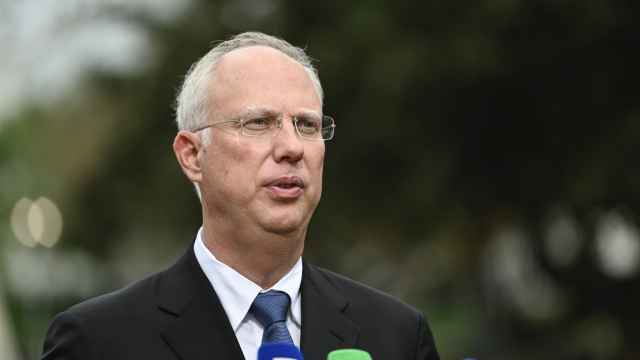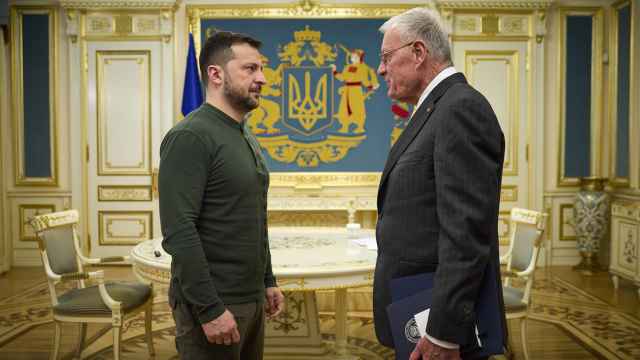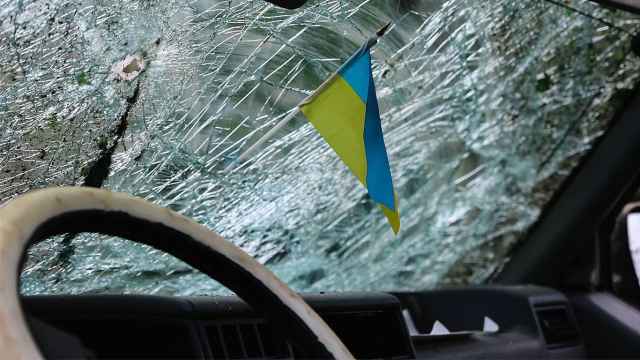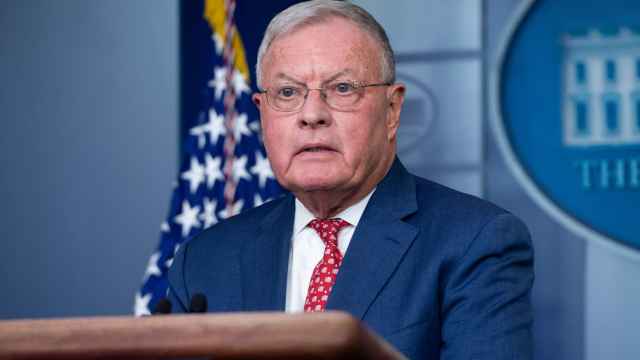After talks with President Vladimir Putin, U.S. envoy Steve Witkoff said he was optimistic about soon striking a peace deal that would give Russia five Ukrainian territories and block Kyiv’s NATO aspirations. Both he and President Donald Trump are wrong.
Trump’s attempts to end Russia’s three-year, full-scale war against Ukraine will fail because they ignore Putin’s demand to “eliminate the root causes” of the war. A few days ago, Russian Foreign Minister Sergei Lavrov described those causes as “the Nazi government, represented by Zelensky and his associates” who were on a mission to “exterminate everything Russian.”
In reality, this amounts to Russia’s denial of Ukraine as a sovereign actor, questioning the democratic legitimacy of President Volodymyr Zelensky and depicting Ukraine as an artificial and U.S. puppet state.
The Trump administration’s approach to peace talks has ignored Russia’s repeated requests for these “root causes” to be resolved before any ceasefire, let alone agreement, can be reached. Trump’s growing frustration with Russia’s foot-dragging is rooted in an unwillingness to understand that Russia will only end its war if Ukraine capitulates by agreeing to jettison its identity, sovereignty and independence and become Little Russia.
As this is unlikely, a successful outcome to Trump’s peace talks will likely be illusory.
On April 1, Russian Deputy Foreign Minister Sergei Ryabkov said the Trump administration is attempting “some kind of scheme” to reach a ceasefire before moving on to “other models and schemes” to end the war. Because this does not address the “root causes” of the war, Russia will not agree to U.S. peace proposals.
Understanding what the Kremlin means by this requires us to appreciate that Putin has held a long-term inability to accept Ukraine as a state fully independent of Russia and a Ukrainian identity distinct from Russian. Putin’s obsession throughout his quarter of a century of direct and indirect rule has been to transform Ukraine through soft and hard power into a puppet state resembling that of President Alexander Lukashenko’s Belarus.
Herein lies the crux of the Trump administration’s difficulties reconciling the Kremlin’s goal of evisceration with that of Ukraine’s defence of its identity, sovereignty and independence.
Contrary to what Trump believes, the Kremlin’s demands to resolve these “roots” lie not in NATO enlargement per se, but in the supposed loss of Ukraine to Putin’s Russian World and the Russian Orthodox Church’s Holy Rus.
The ‘roots’ of the war
Russia has laid claim to Crimea and the port of Sevastopol since the start of the post-Soviet era. Most Russian politicians, even those who claimed to be opposed to Putin’s authoritarian regime, supported Moscow’s goal of “reuniting” with these regions.
Even the pro-Western, democratic President Boris Yeltsin took the entire decade of the 1990s to sign a treaty recognizing Russia’s border with Ukraine. The obstacle, after all, was not Ukraine — President Leonid Kuchma could never been described as anti-Russian. It was Russia.
In 1990, Russian nationalist dissident Alexander Solzhenitsyn called for the Soviet Union to be replaced with a Russian Union of the three eastern Slavic states. Like Putin in his 2008 speech to the NATO-Russia Council, Solzhenitsyn had a history of questioning Ukrainian sovereignty over its southeastern regions.
In 2014, Putin referred to Ukraine’s southeast using the tsarist term of “New Russia,” describing the region as “historically Russian lands” that were wrongly included inside Ukraine. Then, in September 2022, Moscow annexed the four Ukrainian regions of Donetsk, Luhansk, Zaporizhzhia and Kherson following referendums that were deeply flawed, contrary to Witkoff’s view.
Russia demands that Ukraine acknowledge these “realities on the ground” by recognizing the four annexed regions and Crimea as Russian — including territory still held by Ukraine. Putin said borders “must reflect the sovereign decision of the people who live on the lands that we name our historic lands.”
Obviously, these two demands are non-starters for Zelensky. Other Russian officials have gone even further, claiming the cities of Kharkiv, Odesa, Dnipro and Kyiv as “Russian.”
Three important roots of the war, according to the Kremlin, can be found in the second half of the 2000s. The first was the launch of the Russian World Foundation to unite the three eastern Slavic peoples and defend Russians and Russian speakers.
The second was the re-unification of the domestic and emigré branches of the Russian Orthodox Church, which infused imperial nationalism into Russia’s body politic. The third was the election of Kirill as Patriarch of the Russian Orthodox Church and its promotion of the unity of Holy Rus and the trinity of the three eastern Slavs.
Putin returned to the presidency in 2012 determined to enter Russian history as the latest in the pantheon of “gatherers of Russian lands,” a term used for earlier Russian leaders who built the tsarist and Soviet empires.
Ukraine has a central place in this. The core of the Soviet Union was composed of the three eastern Slavic peoples — Russians, Ukrainians and Belarusians — who made up two-thirds of the population and the overwhelming bulk of the political, economic and security elites.
The full-scale invasion of Ukraine is the first stage in rebuilding this core. Vladimir Medinsky, head of the Russian Military History Society who penned Putin’s July 2021 essay on Russian-Ukrainian unity — widely considered to be the ideological treatise of the invasion — even insisted the spring 2022 peace talks be held in the symbolically important Belovezhskaya Pushcha hunting lodge where Russian, Ukrainian and Belarusian leaders dismantled the U.S.S.R. in 1991.
The Kremlin’s determination, coupled with Putin’s obsession with Little Russia, pressured Ukrainian President Viktor Yanukovych to turn Ukraine’s back on European integration. Putin took his revenge against the pro-European demands of the 2013-14 Euromaidan Revolution by initiating Russia’s long-simmering demand to “reunite” with Crimea, invading the Donbas region of eastern Ukraine and setting up proxy enclaves.
Over the next eight years, Putin sought to transform Ukraine into a Belarusian-style puppet state through the Minsk accords. Ukrainian Presidents Petro Poroshenko and Volodymyr Zelensky refused to implement Russia’s reading of these agreements. By 2021, the Kremlin had given up on them and opted for a war, believing Russia would quickly defeat Ukraine because it was an artificial entity and Little Russians would greet the Russian army as liberators. Moscow, which expected a short fight, was unprepared for the resistance they met.
A largely forgotten open letter from August 11, 2009, sent by President Dmitry Medvedev to his Ukrainian counterpart Viktor Yushchenko, reveals the long-term roots of the war. The similarity between Medvedev’s demands and those raised by Putin, Lavrov and Russian officials showcases how the Kremlin’s goals towards Ukraine have remained constant over the last two decades and cannot be ignored by the Trump administration in peace talks to end the war.
Medvedev was never the liberal reformer that the Obama administration and European leaders saw him as. In reality, he held hardline stances towards Georgia, which had been invaded by Russia the year before his open letter, and Ukraine. Medvedev, now deputy head of the Russian Security Council, is one of Russia’s most extreme agitators for military aggression against Ukraine.
Medvedev’s open letter echoed Putin’s view of Russians and Ukrainians as "brotherly peoples" who shared a common history, culture and religion." They both blamed Ukraine for the deterioration in Russian-Ukrainian relations, with Kyiv at fault for refusing to accept that it is a Little Russia.
Medvedev and Putin both have denied that Russia was a threat to Ukraine and therefore brushed aside the need for Ukraine to join NATO. As Medvedev wrote, a Russian threat to Ukraine "does not and cannot exist."
Medvedev in 2009 and Russian leaders since 2022 condemned Ukrainian language, educational, and cultural policies and memory politics. They were, and remain, aghast at a Ukrainian history separate to Russian, “discrimination” against the Russian language in public life, judiciary, education, culture and the media, as well as government interference in the Russian Orthodox Church. Medvedev and Putin denounced Kyiv’s “nationalist interpretation” of the 1933 Holodomor as a “genocide against the Ukrainian people” and glorification of “radical nationalists” and “Nazi collaborators.”
Russian Foreign Minister Sergei Lavrov condemned the “racist Kyiv regime” for the “extermination of everything Russian” in the language, media, and cultural domains and the banning of the Russian Orthodox Church. Lavrov viewed the resolution of these “root causes” as a demand to the Trump administration that should be fulfilled before any peace agreement could be reached.
During the spring 2022 and 2025 peace talks, the Kremlin saw the “root causes” of the war refer to long-standing demands that Ukraine can only exist as a Little Russian puppet state akin to Lukashenka’s White Russia.
Russia’s draft peace treaties from March 7 and April 15, 2022, included annexes demanding the repeal of Ukrainian legislation going as far back as 1993 on the status of war veterans, TV and radio, culture, state service, judiciary, education, the Ukrainian language, indigenous peoples of Ukraine and de-communization. Moscow’s demand to make Russian to become a state language in Ukraine is similar to the language’s elevation in Belarus. The objective of "de-nazification" would be taken care of through this Belarusianization of Ukrainian domestic policies.
Next is the war’s goal of “de-militarizing” Ukraine through removing the goal of NATO membership from the country’s constitution, replacing it with “permanent neutrality,” ending of Western military assistance and training, and a Ukrainian army reduced to a pale reflection of its current size. Ukraine should also support an end to Western sanctions against Russia and no longer seek justice for the 153,000 war crimes committed by Russia by canceling its claims to the International Criminal Court.
Trump will have no peace deal unless Ukraine accepts it is 'Little Russia'
The Kremlin’s demand to “eliminate the root causes” of the war reflects a long-standing unwillingness to view Ukraine as a fully sovereign country and, as seen in the Kremlin’s demands for direct negotiations with the U.S., a deeply held belief that Ukraine has no agency. Medinsky described Ukraine as a “phantom state,” while Lavrov spoke about “the country that is now called Ukraine.” Russian representative to the EU Kirill Logvinov called for Ukraine to be placed under the UN’s "Temporary International Administration," a step that went too far for Trump and the UN.
Medvedev, like Putin and other Russian leaders today, believes most Ukrainians hold a pro-Russian or Little Russian, identity that has been marginalized by a small clique of radical nationalists who are propped up by U.S. and EU puppet masters. Vladislav Surkov, the former "grey cardinal" of Russia’s presidential office, described Ukraine as an “artificial quasi-state” that had been taken over by an “aggressive minority” who turned Ukrainians against Russians. Medvedev made the same complaints over a decade ago.
Trump’s growing frustration with Russia’s foot-dragging is rooted in an unwillingness to understand that Moscow will only end its war if Ukraine capitulates and jettisons its identity, sovereignty and independence to become Little Russia. As that is unlikely, a successful outcome to Trump’s peace talks will prove to be little but an illusion.
A plurality of Americans believe Trump is favoring Russia too heavily in peace talks. Nevertheless, accepting the Kremlin’s demand to view Ukraine as a Little Russia is very likely to be a bridge too far for even the Trump administration, and therefore a ceasefire, let alone a peace agreement, is likely to remain out of reach.
A Message from The Moscow Times:
Dear readers,
We are facing unprecedented challenges. Russia's Prosecutor General's Office has designated The Moscow Times as an "undesirable" organization, criminalizing our work and putting our staff at risk of prosecution. This follows our earlier unjust labeling as a "foreign agent."
These actions are direct attempts to silence independent journalism in Russia. The authorities claim our work "discredits the decisions of the Russian leadership." We see things differently: we strive to provide accurate, unbiased reporting on Russia.
We, the journalists of The Moscow Times, refuse to be silenced. But to continue our work, we need your help.
Your support, no matter how small, makes a world of difference. If you can, please support us monthly starting from just $2. It's quick to set up, and every contribution makes a significant impact.
By supporting The Moscow Times, you're defending open, independent journalism in the face of repression. Thank you for standing with us.
Remind me later.








